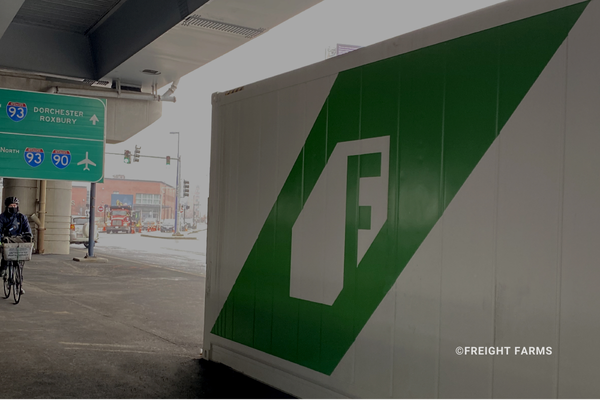Urban Agriculture: Maximizing Space, Minimizing Impact
In today’s rapidly urbanizing world, the demand for locally grown food is increasing, and the challenges posed by limited space in cities are more pressing than ever. Traditional farming requires large swaths of land, water, and resources—something that many urban areas simply don’t have. But what if we could turn city spaces into thriving agricultural hubs?
That’s where urban agriculture comes in.
What is Urban Agriculture?
Urban agriculture refers to the cultivation of crops within and around cities. This practice encompasses everything from small community gardens to rooftop farms, vacant lot farming, and large-scale indoor vertical farming solutions like those offered by Freight Farms. It is a smart solution to food insecurity, the rising demand for locally sourced food, and the need for sustainable agricultural practices in dense, land-scarce environments.
Why Urban Agriculture Matters
Food Security and Access: With over half the world’s population living in cities, urban agriculture offers a sustainable way to provide fresh, healthy produce to urban communities, reducing the need for long-distance food transportation and improving food security.
Sustainability and Environmental Benefits: Traditional farming methods often rely on extensive use of land, water, and energy. Urban farming reduces this footprint by utilizing underused spaces like rooftops and vacant lots, conserving water through hydroponic or aquaponic systems, and lowering emissions by minimizing transportation needs.
Economic Growth and Job Creation: Urban agriculture can also play a role in revitalizing economies by creating jobs, especially in underserved communities. By transforming unused urban spaces into productive farms, cities can stimulate economic growth, foster community engagement, and create green jobs.
Types of Urban Agriculture
Urban agriculture comes in many forms, each suited to different environments and goals. Some of the most popular types include:
Rooftop Farms: These farms utilize the otherwise wasted space atop buildings to grow crops. Rooftop farms help insulate buildings, reduce stormwater runoff, and provide fresh food to the local community.
Community Gardens: Found in neighborhoods, schools, and community centers, these shared spaces allow residents to grow their own produce. Community gardens promote sustainability, education, and a sense of community.
Vertical Farming: Using cutting-edge technology, vertical farms like Freight Farms grow crops indoors in a controlled environment, using hydroponics or aeroponics to optimize space, water use, and energy efficiency. This method enables year-round crop production and a significantly higher yield per square foot than traditional farming. Learn more about different indoor farming methods here.
Vacant Lot Farms: In many urban areas, unused lots are being converted into farms, turning blighted spaces into thriving sources of fresh produce. These lots can help reduce urban heat islands, increase green space, and provide food to nearby residents.
The Impact of Urban Agriculture on Cities
As cities grow, urban agriculture plays a critical role in creating healthier, more resilient communities. Not only does it provide fresh food in areas where access might be limited, but it also fosters social cohesion. Urban farms often become community hubs, where people from different backgrounds come together to work, share knowledge, and engage in sustainable practices.
Urban farming also addresses some of the most pressing environmental issues facing cities today. By incorporating agriculture into urban planning, cities can mitigate heat island effects, reduce stormwater runoff, and increase biodiversity.
Freight Farms: Leading the Urban Farming Movement
Freight Farms is leading the way in urban agriculture with our cutting-edge container farming technology. Our vertical farms allow anyone, anywhere, to grow fresh produce, regardless of location or climate. Whether you're looking to start an urban farm for your school, hospital, or community, Freight Farms provides a turnkey solution that is scalable, sustainable, and efficient.
Our container farms are designed to be compact, automated, and easy to maintain, making them perfect for urban settings. They use significantly less water and energy than traditional farming methods, and with year-round production, they provide a reliable source of fresh produce for city dwellers.
Learn more about the Greenery™ container farms to see how you can start farming in your city.


